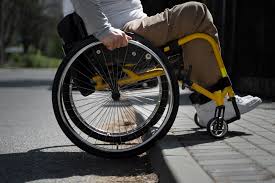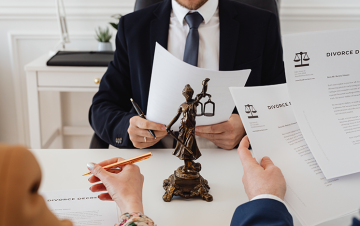Guardianship of a person with a disability in Ukraine: assistance of a lawyer
Guardianship over a person with a disability is an important legal mechanism in Ukraine that protects the rights and interests of persons who cannot exercise their rights independently due to physical or mental disabilities. This process involves careful preparation of documents, legal analysis of the situation, and legal advice to ensure successful guardianship. In this article, we will look at how a lawyer can help in obtaining guardianship over a person with a disability, what documents need to be prepared, and what steps need to be taken to successfully complete this process.Guardianship in Ukraine over a disabled person is established through a legal process that ensures the disabled person's rights and needs are protected.
Determining the legal status of the situation
The first step in the guardianship process is to determine the legal status of the situation. This includes a legal analysis of the situation, during which the lawyer assesses the grounds for granting guardianship, in particular due to the health status of the person with a disability. The grounds may include mental or physical disorders, which are confirmed by medical documents. A legal analysis of the situation allows you to clearly understand what documents need to be prepared and what legal steps should be taken to successfully obtain guardianship.
Preparing for a legal analysis
- Collecting the necessary documents: One of the key stages is the preparation of all necessary documents confirming the health status of a person with a disability. These may include medical certificates, extracts from medical records, examination results, conclusions of specialized doctors, or other documents.
- Verification of documents by a lawyer: A lawyer checks the documents for compliance with legal requirements to avoid possible problems when they are submitted to the court or other relevant authorities.The local social protection authority or administrative service center will tell you where to apply for guardianship over a disabled person.
- Legal analysis of documents: The lawyer evaluates each document from a legal point of view, identifies possible risks and ensures that the package of documents is complete for successful guardianship.
The role of a lawyer in the process
Legal advice: The lawyer provides detailed information about the legal requirements and procedure for obtaining guardianship, and helps determine the best strategy for successful completion of the process.
Legal analysis of the situation: The lawyer conducts a detailed legal analysis of the client's situation to determine the best way to obtain guardianship.
Verification of documents by a lawyer: A lawyer checks all documents that will be submitted to the court or other relevant authorities to ensure that they comply with legal requirements.
Legal opinion: After conducting a legal analysis, the lawyer prepares a legal opinion that contains recommendations for further action.
Verification of documents by a lawyer
Having your documents reviewed by a lawyer is one of the key steps in preparing for guardianship of a person with a disability. You can find out what documents are required for guardianship of a disabled personby contacting the relevant government agency or a lawyer. How much they pay for guardianship over a disabled child depends on state assistance programs and regional policies.This includes
- Analysis of documents: A lawyer carefully reviews each document to ensure that it is correct and complies with legal requirements.Where to arrange guardianship of a disabled person can be found out at the local social services office or through legal consultation.
- Identification of errors: If mistakes are found in the documents, the lawyer helps to correct them to avoid delays or refusal to grant guardianship.
- Ensuring the completeness of the package of documents: The lawyer checks whether all the necessary documents have been collected to avoid possible delays or rejection.
Preparation of a legal opinion
After a comprehensive legal analysis of the documents and the situation, the lawyer prepares a legal opinion. This document contains a risk assessment and recommendations for further action. The legal opinion of a lawyer is an important document that helps to ensure that all actions comply with the requirements of the law.You can find out how to take guardianship of a disabled person by contacting your local administration or social worker.
Solving problems with documents
When preparing documents for guardianship, various problems may arise. How to obtain guardianship of a disabled person in Ukraine involves applying to the court with the necessary documents and undergoing an evaluation process.A lawyer provides a written consultation in which he or she describes in detail possible solutions to such problems:
- Correction of errors: If mistakes are found in the documents, the lawyer helps to correct them and ensures that new documents are properly executed.
- Obtaining additional documents: If the necessary documents are missing, the lawyer helps with collecting them or preparing applications for their receipt.
- Legal support in dealing with guardianship authorities: The lawyer represents the client's interests in interaction with the guardianship authorities or other relevant authorities, ensuring that all necessary documents are properly executed.
Obtaining the necessary approvals and permits
In some cases, additional approvals or permits may be required to obtain guardianship. The lawyer helps to determine which permits are necessary and develops a strategy for obtaining them, including:
- Approvals from guardianship and other authorities: The lawyer helps to obtain the necessary approvals from the guardianship authorities or relevant authorities.
- Obtaining additional documents: If necessary, the lawyer helps to collect additional documents or applications.How to get guardianship over a disabled person typically involves a legal process that includes a court hearing and possibly a social services assessment.
- Other permits: Depending on the situation, the lawyer helps to obtain other permits necessary for successful guardianship.
Resolving disputes regarding guardianship
The process of obtaining guardianship may be accompanied by disputes that require legal support. A lawyer helps to resolve such disputes at various stages of the process, including:
- Negotiations with guardianship authorities: The lawyer represents the client's interests during negotiations with the guardianship authorities, which allows avoiding conflicts and resolving disputed issues without involving the court.How to obtain guardianship for a disabled person includes obtaining a court decision or applying to the guardianship authorities.
- Mediation: If the parties cannot come to an agreement, a lawyer may suggest mediation as a way to resolve the conflict without going to court.
- Litigation: If all other methods have been exhausted, the lawyer represents the client's interests in court, ensuring the protection of his or her rights and interests.
Consultations and support at all stages of the process
The lawyer provides advice and support at all stages of the process of obtaining guardianship over a person with a disability. This includes:
- Consultation on collecting documents: A lawyer helps determine which documents are needed and how to prepare them correctly.How to obtain guardianship over a disabled person depends on the specific situation, but the main steps include filing an application and passing a medical commission.
- Legal support during the application process: The lawyer supervises the application process, interacts with the guardianship authorities and ensures that the case is considered correctly and in a timely manner.What documents are needed for registration of guardianship over a disabled person can be clarified by contacting the local social services or legal authorities.
- Advice on obtaining permits: The lawyer helps to obtain all the necessary permits and approvals, which ensures that the process complies with the requirements of the law.
Legal support in court proceedings
If legal disputes arise in the process of obtaining guardianship, a lawyer provides legal support in court.How to take guardianship of a disabled person requires going through an official procedure, including collecting the necessary documents and having the decision approved by the court. This includes
- Preparation of documents: The lawyer prepares all the necessary documents for submission to the court and ensures that they meet the requirements of the trial.
- Representation of interests in court: A lawyer represents the client's interests during court hearings, ensuring the protection of their rights.
- Appealing decisions: If necessary, the attorney can appeal or challenge the decision of a higher court.
- Guardianship over a disabled person involves the constant care and legal protection of a person who is unable to take care of himself or herself.
Questions and answers
Question.
What are the main stages of obtaining guardianship over a person with a disability?
Answer.
The main stages of obtaining guardianship are determining the legal status, preparing and collecting the necessary documents, submitting an application to the guardianship authorities or the relevant body, and obtaining the necessary approvals and permits. Involving a lawyer helps to avoid possible mistakes and ensures the successful completion of the process.
Obtaining guardianship over a person with a disability is an important and complicated process that requires compliance with all legal requirements and proper paperwork. With the help of a lawyer, you can minimize the risks of refusal and ensure successful guardianship. Legal analysis of documents, verification of documents by a lawyer, legal analysis of the situation and legal advice from a lawyer allow us to ensure that the process complies with the requirements of the law and that the client's interests are properly protected at every stage of obtaining guardianship.How to obtain guardianship for a disabled person includes obtaining a court decision or applying to the guardianship authorities.

































